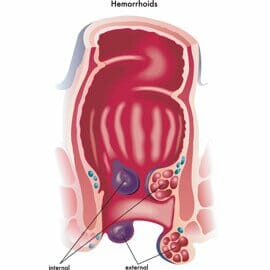The embarrassment, isolation and shame cannot begin to explain the agony people suffering from hemorrhoids (HEM-uh-roids) also known as piles endure. Extreme pain, itchiness, discomfort and bleeding from the back passage leaves a lot to be desired when dealing with this condition. Daily routines can be greatly affected depending on the severity and sadly many only seek for intervention when it is a bit late because of the shame that it carries with it.

What are hemorrhoids?
Hemorrhoids are swollen veins in your anus and lower rectum, similar to varicose veins. Hemorrhoids can develop inside the rectum (internal hemorrhoids) or under the skin around the anus (external hemorrhoids). The signs and symptoms of hemorrhoids usually depend on the type of hemorrhoid, that is to say internal or external. External hemorrhoids are usually characterised by itching or irritation in your anal region, pain or discomfort, swelling around your anus and bleeding. Internal hemorrhoids are usually characterised by painless bleeding during bowel movements and or a prolapsed or protruding hemorrhoid resulting in pain and irritation.
Who is at risk?
Hemorrhoids occur when the veins around your anus stretch under pressure and end up bulging or swelling.
Hemorrhoids are more likely to occur if you:
- Are pregnant
- Sit on the toilet for too long
- Are obese.
- Have a low fiber diet
- Do things that make you strain more, such as heavy lifting
- Have a family history of hemorrhoids
- Have long-term or chronic constipation or diarrhea
- Are between 45 and 65 years old
Can diet help?
Lifestyle changes have proven to be an effective remedy for hemorrhoids both preventative and lessening of the symptoms. Some people have also managed to escape the knife (surgery) with diet alone. A balanced, high-fiber diet, together with plenty of fluids, softens the stool and increases its bulk, which will help you avoid the straining that can cause hemorrhoids or worsen its symptoms. Together with your doctor and dietician, you will be able to draw out a plan on the management of this condition. I have put down below some of the lifestyle changes you can employ but please remember this is for only information purposes, do not replace this for a diagnosis but reach out to a physician for a proper diagnosis.
Lifestyle changes
You can help prevent hemorrhoids or minimize flare-ups by making simple lifestyle changes:
-
Drink water
Drinking plenty of water a day can help reduce the risk of constipation and keep bowel movements soft and easy to pass. -
Eat a balanced, high-fiber diet
Work with your dietician to come up with a balanced diet that is fiber rich, both soluble and insoluble fiber. If you are prone to diarrhea, he or she will be in position to walk the journey with you to reduce the symptoms and avoid it. -
Get some exercise
It goes without asking how exercise is a key part in one’s health. It aids in digestion and tones the supporting muscles of the anal and rectal area as well as the abdomen. Do non strenuous exercise though and be sure to check in with your healthcare provider. -
Do Kegel exercises
For pregnant mothers, kegel exercises are important as they help strengthen the pelvic floor plus anal and rectal muscles after childbirth. This will aid in digestion and prevent constipation. To do a Kegel exercise, tighten your vaginal muscles (as you would if you needed to stop urinating midstream), hold it for a few seconds, release and repeat several times. It’s a discreet exercise you can do almost anywhere. -
Maintain a healthy weight
Extra weight can put more pressure on your abdomen, which increases your chances of getting hemorrhoids. Maintain a healthy weight at all times.
If you do not have hemorrhoids yet, try not to put yourself in a position that would put you at risk. If you have them already, despite the embarrassment it carries, reach out to someone and find yourself some help. Remember it is possible to escape the knife only if you can catch it early.
Best of luck.
See you next Wednesday

/hemorrhoids-causes1-5ae0d9b4ae9ab80037fdacda.png)